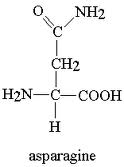Biology
 Asparagine was isolated in 1806 by French chemist Louis Nicolas Vaquelin (1763-1829) and named by French chemist Pierre Jean Robiquet(1785-1838) because it was isolated by asparagus juice. The name of aspartic acid was subsequently given in 1927 by Plisson to the acid obtained heating asparagine with lead hydroxide.
Asparagine was isolated in 1806 by French chemist Louis Nicolas Vaquelin (1763-1829) and named by French chemist Pierre Jean Robiquet(1785-1838) because it was isolated by asparagus juice. The name of aspartic acid was subsequently given in 1927 by Plisson to the acid obtained heating asparagine with lead hydroxide.
- Actinium (ac)
Term: actinium (Ac)Literally meaning: ?pertaining to ray?Origin: 'á???? actis(genitive á??[é???/actinos)(=ray, beam) The element was named after its power of emitting energy in the form of rays suchas radioactive ?radium? which comes from latin...
- Iodine (i)
Term: iodine (I)Literally meaning: ?pertaining to purple?Origin: Anc Greek???????/ioeides (=purple, violet) because of the color of elemental iodine vapor. [<???. 'é???? < /é??= violete (flower) Coined/History Iodine was discovered...
- Glycine (gly C)
Term: glycineLiterally meaning: ?pertaining to sweet?Origin: Anc Greek??????/glykys (=sweet) >????/lyki(=pleasant, bright)Coined/History In 1818 the French chemist Henri Braconnot(1780-1855) isolated glycine from gelatin and named it ?sucrede...
- Leucine (leu L)
Term: leucineLiterally meaning: ?pertaining to white?Origin: Anc Greek??????/leukos(=white)Coined/History Leucine was isolated in 1818 by French chemist Joseph Louis Proust (1754-1855) from cheese in a white crystalline state. Finally it...
- Glucose
Term: glucoseLiterally meaning: ?sweet like?Origin: Greek??????/glycos(=sweet, delightful,) as glycose, an older term for glucose .Coined/History(?)Glucose was discovered in 1747 by German chemist Andreas Marrgraf (1709-1782), who isolated it in raisins....
Biology
asparagine (Asn N)
Term: asparagin (Asn N)
Literally meaning: ?pertaining to asparagus?
Origin: Anc Greek
??? ????????? (plant)/asparagos(asparagus) >???????/spargao(=to vigor)
Coined/History
 Asparagine was isolated in 1806 by French chemist Louis Nicolas Vaquelin (1763-1829) and named by French chemist Pierre Jean Robiquet(1785-1838) because it was isolated by asparagus juice. The name of aspartic acid was subsequently given in 1927 by Plisson to the acid obtained heating asparagine with lead hydroxide.
Asparagine was isolated in 1806 by French chemist Louis Nicolas Vaquelin (1763-1829) and named by French chemist Pierre Jean Robiquet(1785-1838) because it was isolated by asparagus juice. The name of aspartic acid was subsequently given in 1927 by Plisson to the acid obtained heating asparagine with lead hydroxide. Definition
Asparagine is a non essential amino acid which is important for nervous system and ammonia formation.
- Actinium (ac)
Term: actinium (Ac)Literally meaning: ?pertaining to ray?Origin: 'á???? actis(genitive á??[é???/actinos)(=ray, beam) The element was named after its power of emitting energy in the form of rays suchas radioactive ?radium? which comes from latin...
- Iodine (i)
Term: iodine (I)Literally meaning: ?pertaining to purple?Origin: Anc Greek???????/ioeides (=purple, violet) because of the color of elemental iodine vapor. [<???. 'é???? < /é??= violete (flower) Coined/History Iodine was discovered...
- Glycine (gly C)
Term: glycineLiterally meaning: ?pertaining to sweet?Origin: Anc Greek??????/glykys (=sweet) >????/lyki(=pleasant, bright)Coined/History In 1818 the French chemist Henri Braconnot(1780-1855) isolated glycine from gelatin and named it ?sucrede...
- Leucine (leu L)
Term: leucineLiterally meaning: ?pertaining to white?Origin: Anc Greek??????/leukos(=white)Coined/History Leucine was isolated in 1818 by French chemist Joseph Louis Proust (1754-1855) from cheese in a white crystalline state. Finally it...
- Glucose
Term: glucoseLiterally meaning: ?sweet like?Origin: Greek??????/glycos(=sweet, delightful,) as glycose, an older term for glucose .Coined/History(?)Glucose was discovered in 1747 by German chemist Andreas Marrgraf (1709-1782), who isolated it in raisins....
